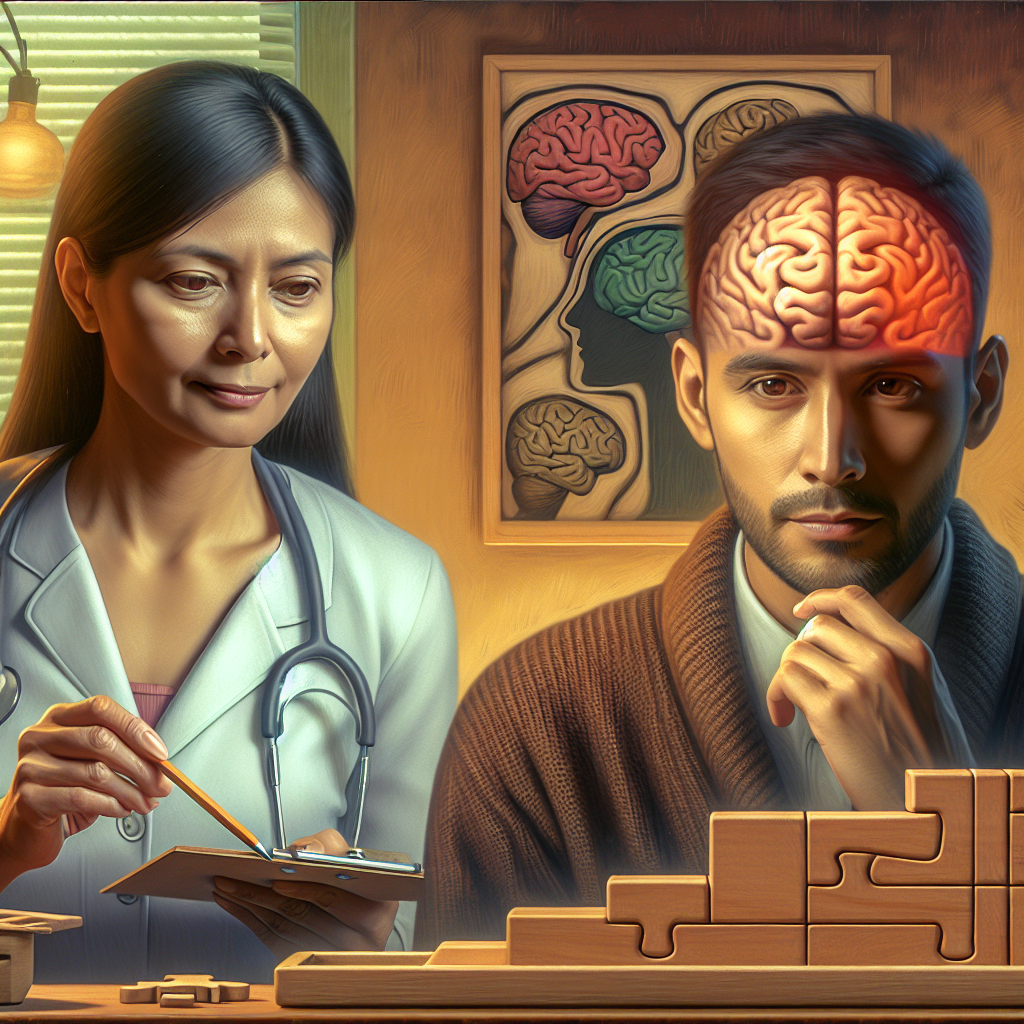What Is Cognitive Rehabilitation Therapy?
Embark on an enlightening journey as you uncover the fascinating world of Cognitive rehabilitation therapy. Illuminating the corners of your mind, this therapy harnesses your intrinsic cognitive abilities to facilitate recovery from brain injuries or neurological disorders. Within the folds of this article, you will unfurl the mystery behind this method, its principles, applications, and how it breathes life back into affected cognitive functions, enabling you a renewed grip on reality.

Understanding Cognitive Rehabilitation Therapy
Dive into the world of restoring the mind with a journey through the enlightening field of cognitive rehabilitation therapy. Imagine rebooting your brain’s functions, much like how a computer may need a software update when things go slightly awry — that’s cognitive rehabilitation therapy in essence.
Definition of cognitive rehabilitation therapy
Cognitive rehabilitation therapy (CRT) refers to a broad convocation of treatments designed to rehabilitate and improve cognitive functions that have been impaired or lost due to injury, disease, or aging. Picture a network of roads under construction, blocked or obscured by adversaries. CRT is like the strategic planning and execution of detours or repairs to help traffic flow smoothly again in your cognitive routes.
Brief history and evolution of cognitive rehabilitation therapy
Like all great therapies, CRT has a backstory. It first entered the therapeutic landscape during the late 19th and early 20th centuries as a response to World War I soldiers’ cognitive impairments due to traumatic brain injuries. From rehabilitation camps to modern therapy centers, the journey of CRT has been one characterized by continuous refinement and evolution in response to emerging cognitive challenges and advancements in neuroscience understanding.
Importance and relevance of cognitive rehabilitation therapy
Why should you care about CRT? Cognitive functions act as the autopilot for our everyday interactions, decisions, and thoughts. Any disruption can ripple in different aspects of life, from personal happiness to work productivity. CRT plays a crucial role in refining these cognitive functions, enabling people to live fulfilled lives despite cognitive challenges.
Who Needs Cognitive Rehabilitation Therapy?
There’s no one-size-fits-all when it comes to CRT. Get a glimpse of some individuals who benefit from this pivotal therapy.
Patients with brain injuries
Visualize waking up one morning and failing to recognize your surroundings or struggling to remember your daily routine. This could be a reality for some patients recovering from a brain injury. CRT comes as a saving grace, helping to restore the neural pathways that have been scrambled.
Individuals with cognitive impairments
Firstly, no impairment is too small to seek help. From memory lapses due to age, to attention difficulties as a result of ADD, CRT can help individuals manage and overcome these obstacles.
People suffering from mental health disorders
Brain fog, memory gaps, concentration issues — these are some cognitive symptoms that can be associated with mental health disorders like depression and anxiety. Through CRT, these individuals can relearn lost skills and incorporate coping strategies into their mental health management routine.
Patients recovering from strokes or neurological diseases
When a stroke or neurological disease disrupts the typical flow of neural traffic, cognitive roadblocks arise. CRT holds the power to guide these individuals back on the highway of day-to-day cognition.
The Objectives of Cognitive Rehabilitation Therapy
Great understanding evolves from clear objectives. Let’s uncover the goals that CRT aims to achieve.
Improvement of cognitive functioning
Much like strengthening a muscle, CRT helps restore and improve weak or impaired cognitive functions. Return to the roadwork analogy; think of this as repairing those closed-off roads to normal functioning.
Enhancement of work and daily life performances
CRT aims to improve individual performance, whether executing a task at work or remembering where you left your keys. Think of it as refining your cognitive navigation system for day-to-day activities.
Develop coping strategies for cognitive deficits
Imagine having a toolkit of strategies and resources designed to help you cope with your cognitive challenges. CRT equips patients with the tools to manage and cope with their deficits more effectively.
Improve overall patient quality of life
Above all, CRT seeks to enhance the quality of life. Possible? Certainly! By improving cognitive functioning, day-to-day life becomes smoother, allowing freedom, independence, and satisfaction to bloom.

Different Techniques in Cognitive Rehabilitation Therapy
No two minds are alike, and CRT recognizes this diversity through the use of various techniques.
Restorative techniques
Restorative techniques work like mental drills, much akin to weight training. Through repeated exercises, these techniques aim to restore lost or impaired cognitive abilities.
Compensatory techniques
Every challenge needs a workaround. Compensatory techniques focus on providing alternative strategies to manage cognitive deficits, like sticky note reminders or alarms for individuals with memory difficulties.
Behavioral interventions
Behavioral interventions merge the realms of cognitive therapy and behavioral therapy. The goal? Modifying behavior to improve cognitive functioning.
Cognitive exercises and drills
Just as a sports team has regular practice, cognitive exercises and drills are a crucial part of CRT. They’re designed to make cognitive operations fitter, stronger, and quicker.
The Cognitive Rehabilitation Therapy Process
Embark on a detailed exploration of the CRT journey, divided into four crucial phases.
Initial assessment and diagnosis
The therapy commences with diagnosing the cognitive impairments or difficulties at hand. Consider this as finding the areas under construction on your cognitive highway.
Development of a personalized treatment plan
Recognize that each mind calls for a unique game plan. CRT therapists analyze the data from the initial assessments to develop personalized treatment plans.
Implementation and adjustment of the treatment plan
Once the plan is formed, the patient undergoes the assigned cognitive exercises and strategies. Along the way, the therapist continuously adjusts and refines therapy based on the patient’s progress.
Evaluation and long-term follow-up
CRT doesn’t stop when the planned treatment ends. Regular follow-ups ensure continued progress, and evaluations determine the long-term success of the therapy.
Role of A Cognitive Rehabilitation Therapist
Behind every effective therapy lies a proficient therapist. Let’s discover their roles in the CRT journey.
Assessing the extent of cognitive impairment
CRT therapists are detective-like, having a keen eye and a deep understanding to assess the patient’s cognitive function potential and limits.
Designing appropriate treatment plans
Therapists also act as strategists. With the obtained assessment data, they craft individualized treatment plans catering to each patient’s unique cognitive needs.
Ongoing evaluation of patient progress
Much like a vigilant sentinel, the therapist continuously evaluates patient progress. Adjustments and refinements are made to the treatment plan as necessary.
Educating patients and families about the therapy process
CRT therapists don the hat of educators as well, enlightening patients and their families about the therapy process to ensure cognizance and cooperation.
Benefits of Cognitive Rehabilitation Therapy
All therapies carry their batch of benefits. Let’s understand what rewarding outcomes CRT has in store.
Enhanced cognitive abilities
The most direct and significant benefit of CRT is the enhancement of cognitive abilities. Whether it’s improving memory, attention span, problem-solving skills, or processing speed, CRT delivers.
Improved daily functioning
By upgrading cognitive abilities, CRT ultimately enhances daily functioning, allowing individuals to navigate daily tasks and chores more effectively and independently.
Increased independence
With improved cognitive functioning, independence inevitably follows. Patients can commit to decisions, solve problems, and remember things without much help, leading to increased self-reliance.
Improved social skills and relationships
As CRT hones cognitive skills, it indirectly benefits social skills and relationships. Better memory and attention can drive meaningful interactions and create robust social relationships.
Challenges and Limitations of Cognitive Rehabilitation Therapy
While CRT brings about numerous benefits, like all therapeutic interventions, it does come with challenges and limitations.
Varied effectiveness among patients
One significant challenge is the varied effectiveness. Just as each mind is unique, so is the therapy’s impact. Patients respond differently, with some showing drastic improvements while others have more subtle changes.
Duration and commitment required for therapy
CRT isn’t a quick fix — it requires time and commitment, something that can be challenging for many. Typically, it involves multiple sessions spread over months, even years.
Potential side effects and drawbacks
Though rare, CRT can sometimes lead to side effects like frustration, fatigue, or a temporary increase in cognitive confusion during the initial phase of the treatment process.
Limitations in treating severe cognitive impairments
While CRT works wonders in mild to moderate cognitive impairments, it has its limitations in treating severe cognitive impairments. The therapy may not yield the same level of results for those with extensive cognitive damage.
Latest Research and Innovations in Cognitive Rehabilitation Therapy
Revolution brings evolution, and it’s as true in CRT as it is elsewhere. Let’s look at the promising road ahead.
Current research directions
Current research projects are exploring new diagnostic tools, innovative techniques, and therapy effectiveness across diverse cognitive impairment types and severity.
Innovations in therapy techniques and approaches
Technological advancements are shaping the future of CRT with digital cognitive exercises, virtual reality-based therapies, and AI-driven treatment planning and implementation.
Future prospects and potential of cognitive rehabilitation therapy
The golden era of CRT is yet to come. With constant innovation and research, the potential to broaden CRT’s reach, effectiveness, and acceptance across the medical field is limitless.
Conclusion: The Significance of Cognitive Rehabilitation Therapy
In the grand theatre of cognitive therapies, CRT stands as a crucial player, an irreplaceable character.
Improved quality of life for many patients
CRT has paved the way for improved quality of life for countless patients, enabling them to regain cognitive abilities and re-enter personal, social, and professional arenas with renewed confidence.
Continued evolution and innovation in the field
With continuous advancements, CRT is on a consistent evolutionary guard. Innovations have broadened therapy techniques and approaches, pushing the boundaries of what’s possible.
The need for further research and development
Even with significant advancements, the journey ahead calls for further research and development. As cognitive impairment complexities continue to surface, CRT needs more extensive research to effectively address them.
Increasing recognition and integration in healthcare practices
Today, CRT is gaining recognition and is being integrated more seamlessly into healthcare practices. Prized for its potential to transform lives, CRT’s acceptance in healthcare is forecasted to continue escalating.
In the grand stand of cognitive therapies, Cognitive Rehabilitation Therapy, with its array of techniques, personalized approach, and commitment to improve cognitive functioning, holds a beacon of hope for those battling cognitive challenges. It is an illuminating pathway, guiding individuals towards cognition recovery and an enhanced quality of life. While recognizing its limitations, we ought to appreciate its potential and celebrate the power of the mind revival that CRT presents.

